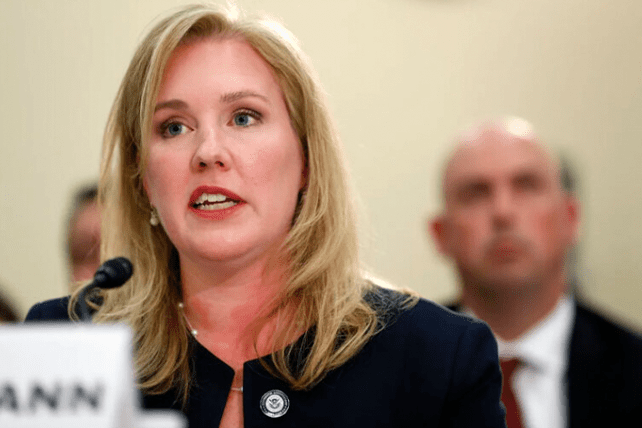
(RNS) — As Elizabeth Neumann watched the events of Jan. 6 unfold, the former assistant secretary for threat prevention and security policy in the Office of Strategy, Policy, and Plans at the Department of Homeland Security was horrified. Reared in conservative Christian communities, she found herself deeply disturbed by the violence, but also the preponderance of Christian flags waved by insurrectionists and the prayers some shouted as they attacked the U.S. Capitol.
“You had this intermixing of Christian ideas, symbols and Scriptures, somehow justifying this violence that happened on Jan. 6,” Neumann said in a recent interview.
Months before, Neumann had resigned from the Trump administration, claiming the then-president was dismissive of domestic terrorist threats. In the years since, she has grown increasingly convinced that conservative Christians are being exploited not just by politicians, but also by extremist groups, giving rise to a dangerous form of faith-infused radicalism.
In a new book, “Kingdom of Rage: The Rise of Christian Extremism and the Path Back to Peace,” Neumann chronicles this exploitation and offers ways to prevent further radicalization. She recently spoke with RNS to discuss her findings and share where she finds hope for the future.
This interview has been edited for length and clarity.
What drove you to write this book?
It actually came out of an interview that I gave to POLITICO in February 2021, a month after Jan. 6. They asked about what we saw on Jan. 6 from the Christian community. A cross on Capitol grounds. People praying over bullhorns in the Senate gallery. Placards with different Bible verses. In December, before Jan. 6, you had the Jericho March, where they tried to play out the Israelites marching around Jericho and praying over Washington that we’re going to ‘defeat the evil.’
On Jan. 6, you felt your community had completed a “rage-filled metamorphosis into violent extremists.” Terms like radicalization and extremism are common in your work, but can you say more about your choice of words?
Somewhere in the POLITICO interview, I labeled it Christian extremism. I hadn’t given much thought to that label, but I definitely felt as if we had Christians present who were demonstrating extremist activity and belief.
I spend some time introducing the reader to the way the counterterrorism community views extremism. I offer a definition of extremism and radicalization and then try to help people understand what the evidence shows us about why somebody radicalizes.
If somebody says, ‘This is the most consequential election of our lifetime. If Donald Trump doesn’t win, then the country’s gonna go to hell. So, therefore, I’m going to go vote for Donald Trump,’ that is not extremism. The premise is maybe not healthy, spiritually or psychologically, but it’s not extremism. But if somebody’s ‘therefore’ is, ‘I’m gonna go monitor polling places wearing my military fatigues and carrying my AR-15, just to make sure no funny business happens,’ you’re moving into intimidation and harassment and also into something that’s illegal. That’s the difference.
You note in the book that white nationalism and Christian nationalism movements have taken advantage of Christian communities. How did we end up here?
Some are coming from legitimate places of fear and grievance. The sexual ethic in this country has changed drastically in the last 10 years. Obergefell v. Hodges (the Supreme Court decision establishing marriage for same-sex partners) is a key moment. The law of the land used to adhere to a traditional biblical sexual ethic and it kind of changed overnight. We’re still catching up as a community to try to understand what that means.
In that great uncertainty, we can become really vulnerable to extremists. Extremists are really good at painting black and white pictures, and they offer this certainty that comes from some form of hostile action.
As the Christian community identifies itself with that political right, they’re also intermingling with extremists. That confluence is where there’s great danger. Most people are not going to go be violent extremists, but if we want to reduce the amount of violence in the country, we need to reduce the exposure to extremism.











